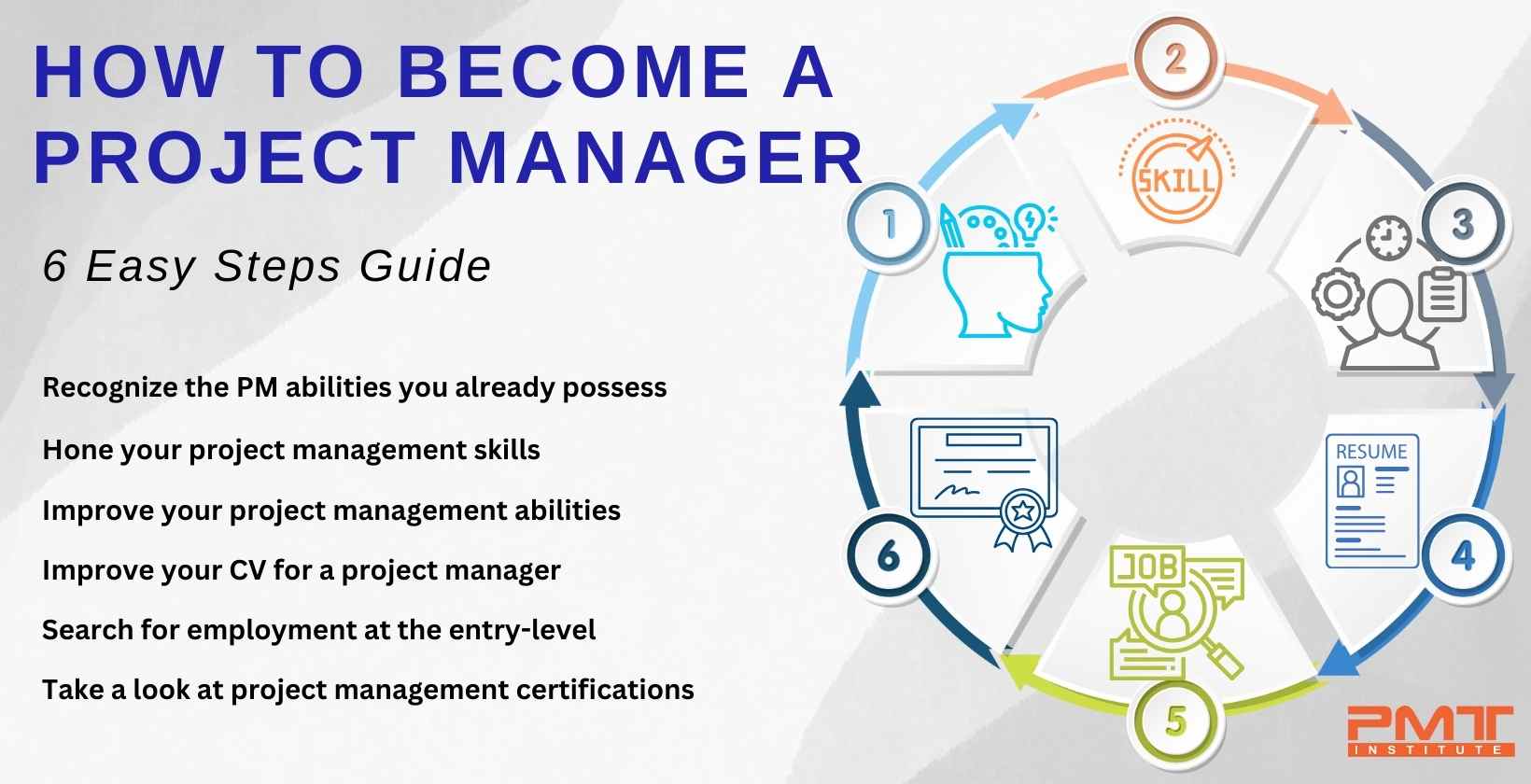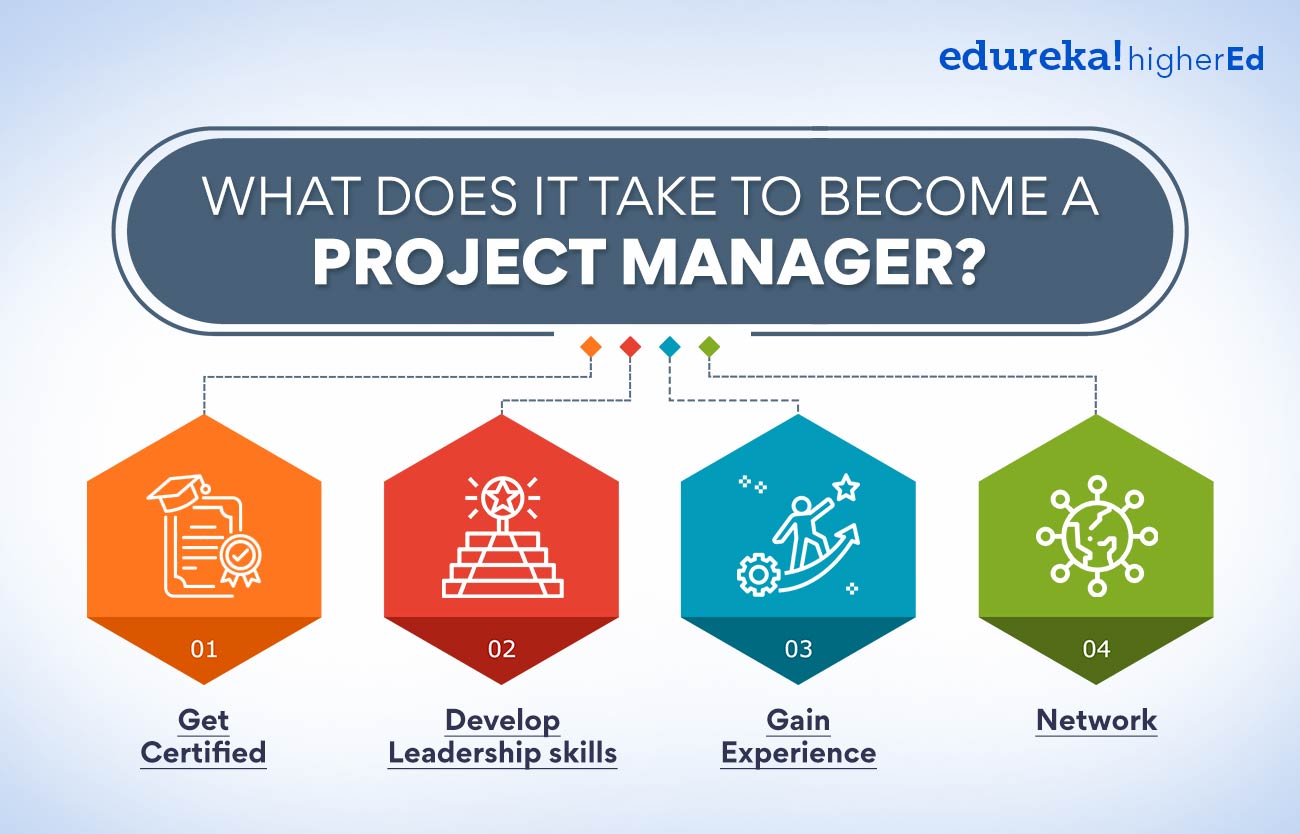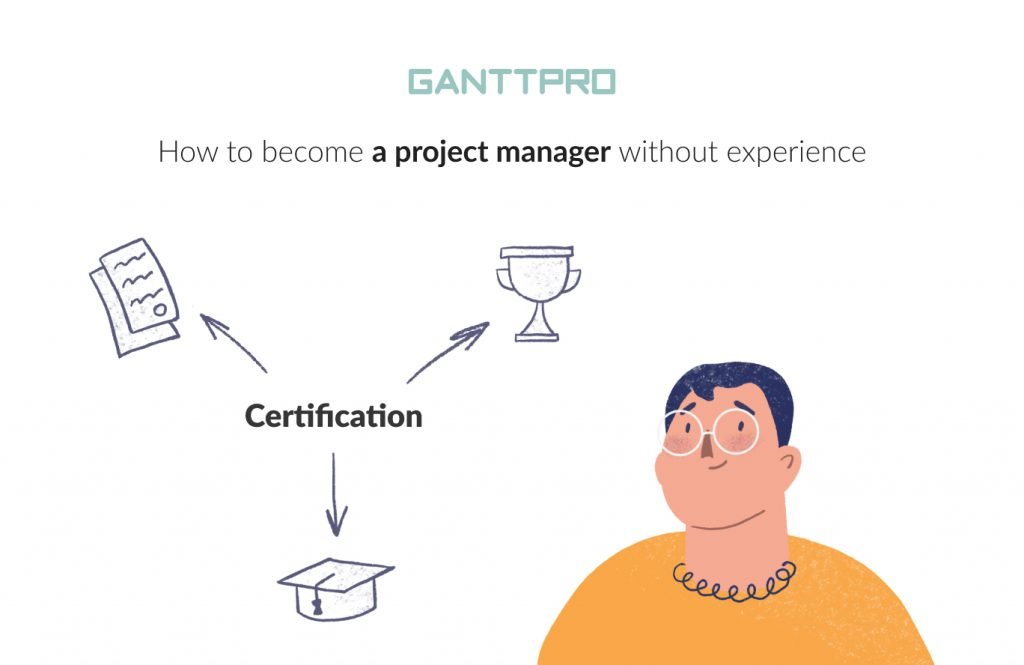Become a project manager without experience by gaining relevant certifications, developing organizational skills, networking, volunteering for projects, learning project management tools, and seeking entry-level roles.
Project management is a vital skill in today’s job market. Organizations need people who can plan, execute, and oversee projects efficiently. You might wonder how to get into this field without a background in it. The good news is that you can develop the necessary skills and knowledge through various means.
Online courses, certifications, and volunteering for projects can give you the foundation you need. This guide will show you practical steps to start your journey as a project manager, even if you lack direct experience. Let’s explore how you can achieve this career goal.
Introduction To Project Management
Project Management is a key skill in today’s job market. It involves planning, executing, and closing projects. Many people think you need experience to start. But, that’s not always true. You can become a project manager without experience. This guide will help you understand how.
What Is Project Management?
Project Management is the process of managing a project from start to finish. It includes planning, execution, and closing. The goal is to meet the project’s objectives. These tasks require skills in communication, time management, and problem-solving.
A project manager oversees the team. They ensure the project stays on track. They also manage resources and handle any issues that arise. This role is vital for the success of any project.
Importance In Today’s Market
In today’s market, project management is crucial. Companies need skilled project managers to stay competitive. These professionals help businesses achieve their goals. They ensure projects are completed on time and within budget.
Project managers also improve efficiency. They streamline processes and reduce waste. This leads to cost savings and better outcomes. As a result, the demand for project managers is high.
In summary, project management is a valuable skill. It benefits both the company and the project manager. With the right approach, you can start a career in this field, even without experience.
Assessing Your Current Skills
Understanding your current skills is the first step to becoming a project manager without experience. You might have skills that can be applied to project management. This section will help you identify and assess these skills.
Identify Transferable Skills
Transferable skills are abilities you have gained in one job that can be used in another role. These skills can help you transition into project management. Here are some examples:
- Communication: The ability to convey information clearly and effectively.
- Leadership: Experience in leading teams or projects, even in non-official capacities.
- Time Management: Skills in organizing tasks and managing deadlines.
- Problem Solving: The ability to find solutions to issues as they arise.
Think about your past roles. Did you lead a team? Did you manage a budget? These experiences count as transferable skills.
Self-assessment Tools
Self-assessment tools can help you evaluate your skills. These tools can identify strengths and areas for improvement. Here are some self-assessment tools you can use:
| Tool | Description | Link |
|---|---|---|
| StrengthsFinder | Assess your personality type. | Visit |
| Myers-Briggs | Evaluate your skill set. | Visit |
| SkillScan | Evaluates your skill set. | Visit |
Using these tools, you can better understand your strengths. This understanding will guide you in your journey to becoming a project manager.
Learning Project Management Basics
Starting a career in project management can seem daunting without experience. But learning the basics can help you take the first step. Understanding project management concepts is essential. It forms the foundation for your future success.
Online Courses
Online courses are a great way to learn project management basics. Many platforms offer free and paid courses. These courses cover essential topics like project planning, budgeting, and risk management.
- Coursera: Offers courses from top universities.
- edX: Provides access to courses from renowned institutions.
- Udemy: Features a wide range of affordable courses.
Each platform offers different levels of courses. Beginners can start with introductory courses. Advanced learners can choose specialized topics. These courses often include quizzes and assignments. They help reinforce what you have learned.
Essential Books To Read
Books are another valuable resource. They provide in-depth knowledge about project management. Reading books written by experts can offer unique insights.
| Title | Author |
|---|---|
| “Project Management Absolute Beginner’s Guide” | Gregory M. Horine |
| “A Guide to the Project Management Body of Knowledge (PMBOK Guide)” | Project Management Institute |
| “The Fast Forward MBA in Project Management” | Eric Verzuh |
These books cover a wide range of topics. From basic principles to advanced techniques. They are essential reads for aspiring project managers. They help build a strong foundation in project management.

Credit: www.geeksforgeeks.org
Building A Network
Building a network is crucial for anyone aiming to become a project manager without experience. A strong network can open doors and provide you with opportunities for learning and growth. Connecting with professionals in your field can give you insights, advice, and sometimes even job leads. Here are some effective ways to build your network:
Joining Professional Groups
Joining professional groups can be a great start. Look for groups related to project management on platforms like LinkedIn and Facebook. These groups often share valuable resources and job postings. Engage in discussions and ask questions. This will help you learn and get noticed by industry professionals.
Some popular professional groups you can join include:
- Project Management Institute (PMI)
- Association for Project Management (APM)
- International Project Management Association (IPMA)
By being active in these groups, you can build relationships and gain knowledge.
Attending Industry Events
Attending industry events is another great way to build your network. Events like conferences, workshops, and seminars are perfect for meeting like-minded individuals. These events often have sessions that cover the latest trends and best practices in project management.
Here are some types of events you should consider:
- Conferences
- Workshops
- Seminars
- Networking Meetups
During these events, make it a point to introduce yourself to speakers and attendees. Collect business cards and follow up with them on LinkedIn or via email. Building genuine connections can lead to mentorship opportunities and job referrals.
Remember, networking is not just about taking. Offer your help and share your own insights too. This makes your relationships more meaningful and lasting.
Gaining Practical Experience
Starting a career in project management without experience can seem daunting. But there are ways to gain practical experience that can build your resume and skills. These methods allow you to develop a portfolio that demonstrates your capability. Let’s explore some effective ways to gain practical experience in project management.
Volunteering For Projects
Volunteering is a great way to gain project management experience. Many non-profits and community organizations need help with projects. They often welcome volunteers to manage events, campaigns, or specific projects.
- Find local non-profit organizations: Look for organizations that align with your interests.
- Offer your services: Reach out and express your willingness to help.
- Take on leadership roles: Volunteer to lead projects or manage teams.
Volunteering helps you develop key project management skills. It shows your dedication and willingness to learn. Plus, it provides real-life experience that you can add to your resume.
Freelance Opportunities
Freelancing is another excellent way to gain project management experience. Websites like Upwork and Fiverr offer many freelance project management jobs. These opportunities range from small, short-term projects to longer, more complex ones.
- Create a profile on freelance websites: Highlight your skills and willingness to learn.
- Bid on projects: Start with small projects to build your reputation.
- Gather feedback: Positive reviews from clients can boost your profile.
Freelancing allows you to work on diverse projects. It helps you understand different industries and project types. Over time, you build a portfolio that showcases your skills and experience. This can be invaluable when applying for full-time project management roles.

Credit: www.4pmti.com
Creating A Strong Resume
Creating a strong resume is crucial when aiming to become a project manager without experience. Your resume should showcase your skills and highlight your potential to excel in a project management role. Here’s how to create a compelling resume that catches the employer’s eye.
Highlighting Relevant Skills
Identify skills that align with project management. These may include leadership, communication, problem-solving, and time management. List these skills prominently on your resume. Use bullet points for clarity and impact.
- Leadership: Demonstrated through roles like team captain or group leader.
- Communication: Proven by public speaking or writing experience.
- Problem-Solving: Shown by resolving conflicts or improving processes.
- Time Management: Evidenced by meeting deadlines and managing schedules.
Tailoring For Project Management Roles
Customize your resume for each job application. Focus on relevant experiences and skills that match the job description. Use keywords from the job posting to pass through Applicant Tracking Systems (ATS).
Consider the following sections in your resume:
- Summary: A brief overview of your qualifications and career goals.
- Skills: A list of key skills relevant to project management.
- Experience: Highlight roles that require project management skills, even if unofficial.
- Education: Include any courses or certifications related to project management.
Example of a tailored experience section:
| Role | Skills Highlighted |
|---|---|
| Team Leader at XYZ Company | Leadership, Communication, Time Management |
| Event Coordinator for ABC Event | Problem-Solving, Organization, Coordination |
By highlighting relevant skills and tailoring your resume for each role, you increase your chances of securing an interview.
Preparing For Interviews
Preparing for a project manager interview without experience can be daunting. But the right preparation can help you showcase your potential and land the job. Focus on common interview questions and how you can highlight your skills and abilities.
Common Interview Questions
Understanding common interview questions is key. Below are some questions you might encounter:
- Tell me about yourself.
- Why do you want to be a project manager?
- How do you handle tight deadlines?
- Describe a time when you led a team.
- How do you prioritize tasks?
Practice your responses. Keep them concise and relevant. Show how your past experiences relate to project management.
Showcasing Your Potential
Even without direct experience, you can still showcase your potential. Highlight transferable skills such as:
- Leadership: Mention any leadership roles you’ve held.
- Communication: Detail instances where you effectively communicated.
- Problem-Solving: Share examples of solving complex problems.
- Organizational Skills: Demonstrate your ability to stay organized.
Use a table to outline your skills and how they apply to project management:
| Skill | Example |
|---|---|
| Leadership | Led a team of five in a school project |
| Communication | Presented weekly reports to senior management |
| Problem-Solving | Resolved a critical issue during an event |
| Organization | Managed multiple deadlines for different tasks |
Remember to be confident. Your unique experiences and skills make you a strong candidate.

Credit: www.edureka.co
Continuing Education And Certification
Continuing education and certification can open doors in project management. Having the right certifications can validate your skills and enhance your resume. This section explores crucial certifications that can help you become a project manager.
Pmp Certification
The Project Management Professional (PMP) certification is one of the most recognized in the industry. It is offered by the Project Management Institute (PMI). To get this certification, you need to meet certain criteria.
- A four-year degree
- 36 months of project management experience
- 35 hours of project management education
Alternatively, if you have a high school diploma, you need:
- 60 months of project management experience
- 35 hours of project management education
Passing the PMP exam demonstrates your expertise. It shows that you can manage projects effectively.
Other Valuable Certifications
Besides PMP, other certifications can also boost your career. They include:
| Certification | Provider | Benefits |
|---|---|---|
| Certified Associate in Project Management (CAPM) | PMI | Ideal for those with less experience |
| Agile Certified Practitioner (PMI-ACP) | PMI | Focuses on Agile methodologies |
| Certified ScrumMaster (CSM) | Scrum Alliance | Specializes in Scrum framework |
| PRINCE2 | AXELOS | Popular in Europe and Australia |
Each certification has its own set of requirements and benefits. Choose the one that aligns with your career goals.
Leveraging Technology
Leveraging technology can be your secret weapon to become a project manager without experience. With the right tools and knowledge, you can bridge the gap and demonstrate your capabilities effectively. This section will explore how to make the most of technology for your project management journey.
Project Management Software
Project management software is essential for any aspiring project manager. These tools help you plan, organize, and manage resources effectively. Popular options include:
- Trello – Visual task management with boards and cards.
- Asana – Task tracking and project management for teams.
- Microsoft Project – Comprehensive project planning and scheduling.
Using these tools, you can manage projects even without prior experience. They offer templates and guides to help you get started. Experiment with different software to find what works best for you.
Staying Updated With Trends
Staying updated with project management trends is crucial. The industry evolves fast, and new practices emerge regularly. Here are some ways to keep up:
- Read Blogs: Follow popular project management blogs.
- Join Forums: Participate in online communities and discussions.
- Take Courses: Enroll in online courses and certifications.
Being aware of the latest trends helps you adopt best practices. It also shows your commitment to continuous learning, which is valuable for any project manager.
Conclusion And Next Steps
Becoming a project manager without experience can seem challenging. But with the right steps and dedication, you can achieve it. This section will outline the final steps to take on your journey.
Setting Long-term Goals
Setting long-term goals is crucial for success. Start by identifying your career aspirations. Consider where you see yourself in five or ten years. Write down these goals and create a plan to achieve them.
Break down your long-term goals into smaller, manageable tasks. This makes them easier to achieve and keeps you motivated. For instance, if your goal is to lead a project team, start by seeking leadership opportunities in your current role.
Use a table to track your progress:
| Goal | Steps | Deadline |
|---|---|---|
| Lead a project team | Seek leadership roles | 6 months |
| Earn a PMP certification | Study and pass exam | 1 year |
Maintaining Professional Growth
Professional growth is an ongoing process. Stay current with industry trends and best practices. Join professional organizations like the Project Management Institute (PMI). Attend webinars, workshops, and conferences.
Consider furthering your education. Online courses and certifications can boost your knowledge. Look for courses in project management, leadership, and communication.
Network with other project managers. This can provide valuable insights and opportunities. Join online forums and participate in discussions.
Use these strategies to maintain your professional growth:
- Read industry blogs and publications.
- Take online courses and certifications.
- Join professional organizations and attend events.
- Network with peers and mentors.
Remember, becoming a successful project manager takes time and effort. Stay focused on your goals and keep learning. Your journey may be challenging, but it is achievable with dedication.
Frequently Asked Questions
Can You Become A Project Manager Without Experience?
Yes, you can. Focus on transferable skills like communication, organization, and leadership. Gain knowledge through courses and certifications.
What Skills Are Needed To Be A Project Manager?
Key skills include leadership, organization, communication, and problem-solving. Familiarity with project management tools is also beneficial.
Are Certifications Necessary For Becoming A Project Manager?
Certifications aren’t mandatory but can boost your credibility. Consider PMP, CAPM, or Agile certifications to enhance your qualifications.
How Can I Gain Project Management Experience?
Volunteer for projects, take on leadership roles, or shadow experienced project managers. Online courses and internships can also help.
Conclusion
Starting as a project manager without experience is possible. Focus on building relevant skills. Take online courses and earn certifications. Network with professionals in the field. Volunteer for project roles in your current job. Gain hands-on experience through internships. Showcase your abilities confidently.
Persistence is key. Keep learning and improving. Stay motivated and patient. Success will follow with dedication. Your journey to becoming a project manager starts now.
Related posts:
- What is the Difference between Project Management And Operations Management: Key Insights
- Project Manager Engineering Land Development Infrastructure: Key Strategies for Success
- Mastering BCWP Calculation for Effective Project Management Success
- Who Should Project Manager Involve in Integration Process: Key Stakeholders

